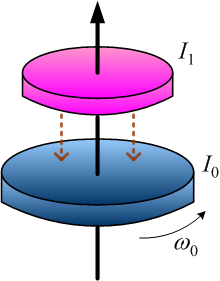A solid cylinder with a moment of inertia, \(I_0\), rotates about its center at an angular velocity of \(\omega_0\). Another solid cylinder, which is initially rest, is put onto the rotating one gently. Both eventually rotate at an angular velocity, \(\omega_f\). Find the velocity of \(\omega_f\).
Answer:
The angular momentum is defined as the moment of inertia times its angular velocity:
\[ L = I\omega \]
With the constant velocity, initial and final angular momenta should be conserved. Namely, the initial total momentum = the final total momentum. In this case, we have
\[ I_0 \omega_0 = (I_0 + I_1)\omega_1 \]
Then, solve for \(\omega_f\).
\[ \omega_f = \frac{I_0 \omega_0}{I_0 + I_1} \]

